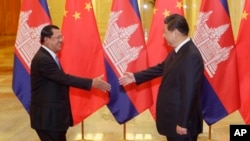[Editor's Note: Dr. Charles Edel is a senior fellow and visiting scholar at the United States Studies Center and the author of a recent article on “Cambodia’s Troubling Tilt Toward China and What It Means for Washington’s Indo-Pacific Strategy.” Previously he held the position of the policy planning staff for the US Secretary of State. He was an associate professor of strategy and policy at the US Naval War College. He recently spoke with VOA’s Sotheary You about Cambodia’s increasing reliance on China for political and economic support.]
What do you think about the position of Cambodia regarding the Indo-Pacific Strategy?
The point of mine is that actually if you think about the geography of the Indo-Pacific, in many ways, Southeast Asia is right in the middle of it. In many ways, Cambodia is right in the middle of it. But it is not a country that is often talked about - how Washington will engage with it. So, I thought that it really presents an opportunity to broaden how America thinks about its engagement in the region, and, in some ways, the country that is the hardest for America to engage with, I think. So that was really the genesis of the text.
Is the United States interested in engaging Cambodia in the strategy?
I think it is. But I think in some ways it is more challenging to engage with a county that is moving away from being a free and open society as a country itself which of course makes it more challenging. And one of the things that struck me when I was in Cambodia is there is an interest and need for, of course, foreign investment, and investment that comes from multiple sources. That’s always how you make it more competitive for a country. And yet, there seems to be restrictions on that because, for there to be a route to have more open investment, there needs to be more transparency. And it seems to be [heading the] opposite way.
In your article, you wrote about “white elephant projects, ghost cities and Potemkin villages.” What are the implications of that based on other countries’ experiences or Cambodia itself?
The implications are simple. First of all, there are projects undertaken that are working for whoever is investing in them, whichever people have made the deal, but not for the people who live in the country necessarily. It also means, and this is kind of the furthest extreme that we’ve seen in other countries, when a country begins to take on unsustainable level of debt, and particularly with China—we’ve seen in multiple other countries, in Sri Lanka, Pakistan and somewhere in the pacific island—all of a sudden, the forfeiture for that debt tends to be sovereign assets. And so when countries cannot pay back the projects, and when they are white elephant projects that, in fact, don’t contribute to the development and prosperity of the country, all of a sudden, there tends to be, you know, crises for sovereign assets of the country.
You raised concerns about the ‘Chinese debt trap’. With the retreat of the West from Cambodia and the engagement of China with millions of dollars of investment, do you see Cambodia falling into this trap in the future?
I think the possibility of it going into the trap gets heightened. It gets heightened when more debt is taken on, and there are not alternative sources of revenue or even alternative sources of bidders for projects that are brought in. Now the debt trap that I talked about, that I wrote about, and which I went through with other countries as well, is not just that countries are in debt, and in some ways unsustainable debt. It’s [also] what happens when their creditor says ‘you are in debt, and now I need a payoff in exchange for that.’ So, will it happen [to Cambodia] or not? I, of course, can’t tell the future.
The debt trap is not simply that countries accumulate debt. There are more steps to it than that. The debt trap diplomacy, of which we speak, when we talk about what happened in countries like Sri Lanka, in the Maldives, and in several in the south Pacific Islands, in Djibouti and elsewhere, is that they have taken on unsustainable levels of debt; that the country cannot actually pay the debt back. When that happens, the creditors, in this instance we are talking about Chinese companies or the Chinese government, in some instances, has asked for the forfeiture of sovereign assets, either the territorial locations or other things. So, again in Cambodia, I don’t know if this will happen or not. But as the debt level rises to only one creditor without other sources of revenue coming in and with no real productive, sustainable development, it heightens the chances of there being something like this in the future.
You mentioned that Cambodia is not in China’s pocket even if the current leadership is. So what does it mean?
Well, what I meant by that is the current government of Beijing—anything, almost anything that China wants is what Hun Sen is willing to do. However, from my experience there, when I was on research, this is not the attitude of Cambodia. So when I wrote that, I meant that this struck me as resistance and, in some senses, anger. And whenever we talked about projects, we talked about the fact that Cambodians are often not employed, but [you have] large-scale inflows of Chinese workers. This is also particularly true when we talked about the Cambodian coastline. Twenty percent of the Cambodian coastline is sold secretly, almost. In particular, there was anger at the fact that the projects were almost all, or many of them, employing Chinese workers who are brought in, and Cambodians were moved off their land for a project that sometimes was helpful, sometimes not helpful. And also, there seems to be some real anger at this project down on the coast where 20 percent of the coastline had been sold secretly, and apparently in contravention of Cambodia’s laws, to a Chinese business.
You mentioned that the United States and its allies need to look at Cambodia with fresh eyes. What do you mean exactly?
I think they need to do that not because it is a small country, but because it is a country that has enormous potential. It is a country that has a very young population, and that has, in many ways, been growing economically. In fact, I also think that because the centerpiece of Washington’s free and open strategy is to help countries choose their own destinies, and not have to choose their destinies based on how other countries tell them to. So, the fact that Cambodia is a harder country for this to happen under the current regime should make it that much more important not less important to the US and its allies.
You wrote that China’s defense minister claimed that Cambodia was a loyal friend. I have heard many times about Cambodia being a loyal friend to China. What does it mean to the United States and its allies?
Well, the question, I think, and the concern is what does loyalty bring for Cambodia? Has it helped advance Cambodia’s interests? I started to say this earlier. The reason this matters more now is because there is a troubling phenomenon happening in Asia, but also worldwide at this point, that authoritarian regimes—those who want to close off space for their own people, close off civil societies, close down the way that people create, close off the free exchange of ideas and people, are in the ascendance, are making moves. And, a lot of this comes out of work very closely with an authoritarian model that resides in Beijing and in Moscow. The fact is, when we see this spread to other countries, this is something that cannot be in the interest of a West which believes in a free and open globalized world. This is a concern and particularly as Cambodia, or at least Hun Sen’s Cambodia, is willing to crank up the authoritarian nature of their own society and protect Chinese interests abroad.
Note: This interview has been edited for length and clarity.








